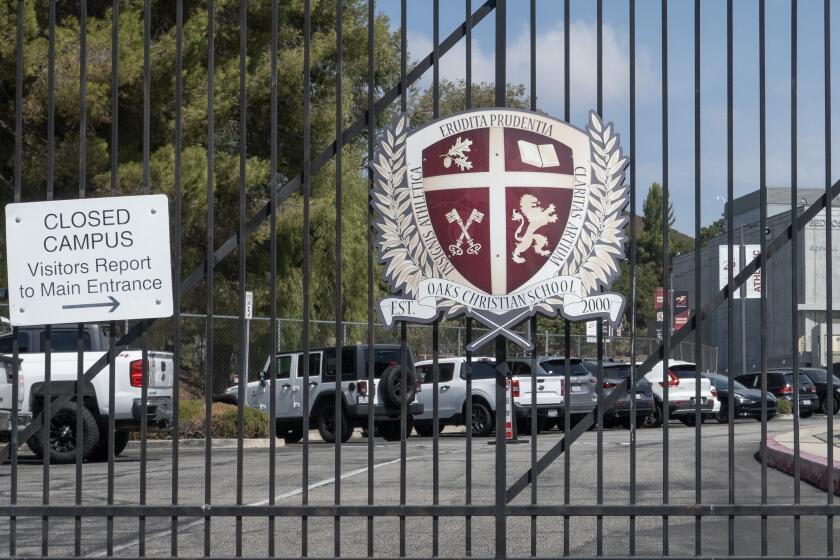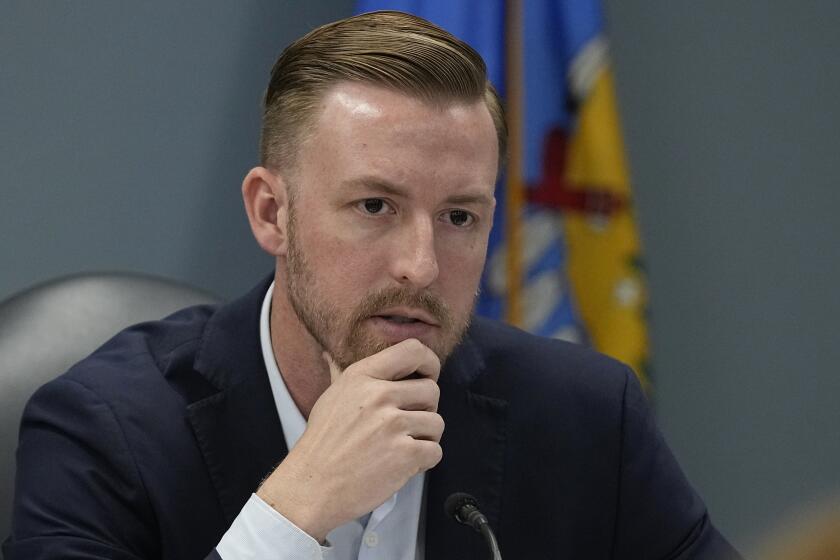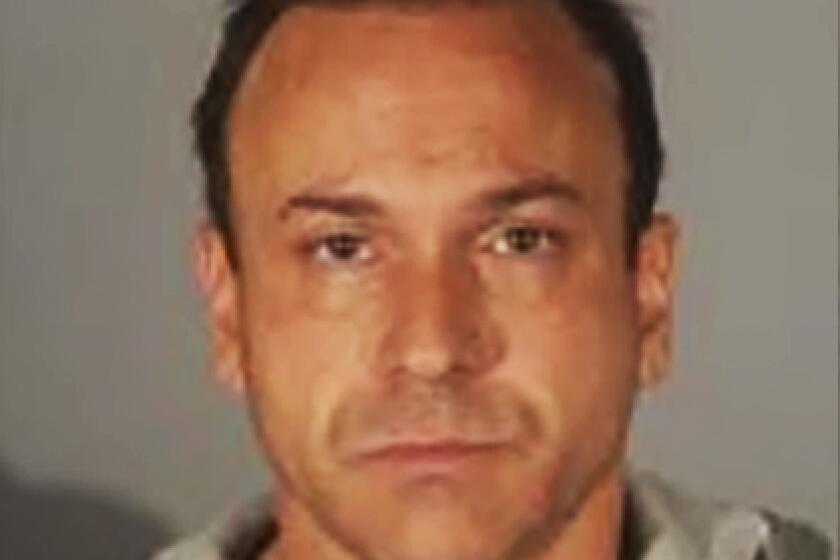Time May Be Up for a Battle of Wits
The California Academic Decathlon, which has spurred high school students of varying abilities to reach for greater intellectual heights since its founding more than three decades ago, is in danger of going broke, its director said.
Without a fresh infusion of cash, the popular, privately-funded contest may not survive even long enough to hold its annual state championship in March, Executive Director Marvin Cobb told The Times. And without a state competition, California teams could not participate in the national contest -- in which they have won 10 championship titles since 1982.
Dwindling corporate contributions and a sluggish economy are the main reasons Cobb said the organization has reached such a crisis. He said he was looking for new donors to maintain the $250,000 annual budget but so far, he has had little success.
“It’s daunting. It’s what keeps me awake at night,” he said.
Cobb’s disclosure comes as schools all over California are assembling their nine-member teams and preparing for the grueling rounds of competition that have for some -- most recently, El Camino Real High School in the San Fernando Valley -- led to the national championship. Along the way, whether they win or not, students improve their study habits and writing and speaking skills, learn to work as a team and gain self-confidence, participants say.
“It’s a very powerful program,” said teacher Donald Singleton, who has coached Dorsey High’s Academic Decathlon teams for about seven years and has seen the program dramatically improve the academic prospects of participants at the mostly low-income, minority school in southwest Los Angeles. The seniors from last year’s team all have gone on to four-year colleges, including UC Berkeley and the Air Force Academy, Singleton said.
“Our kids don’t get into four-year colleges at the same rate as kids at suburban high schools, but the Academic Decathlon is an opportunity to prepare them for a lifelong commitment to education,” he said. “It takes them into an academic rigor that they might not otherwise experience.”
Perhaps the best known of all high school scholastic competitions, the Academic Decathlon was founded in 1968 by the late Robert Peterson, a longtime superintendent of Orange County schools.
The competition, which includes A, B and C students, quickly spread throughout California and other states.
Peterson believed students of all abilities, not just academic standouts, should have the chance to test their intellectual mettle and to reap the benefits of success.
Throughout the school year, students stay after class and meet on weekends to prepare for the 10 academic subjects the contest covers. They also must write essays, give speeches and participate in interviews. The “Super Quiz,” only portion of the contest open to the public, often draws cheering classmates and families waving school banners.
Officials formed the nonprofit United States Academic Decathlon in 1981, which assists chapters in 40 states and holds national championships every spring. California, along with Texas, has produced the most top teams. Few programs get tax dollars and most, like California, rely heavily on private fundraising.
About 2,000 public and private high schools -- more than 500 of them in California -- participate in local, regional or state competitions, officials estimate. Next year, the top teams will vie for the national title in Chicago, from April 13-16.
For many California school districts, the state’s absence would be unthinkable.
“I’ve seen the difference it’s made for kids, how they’ve learned to embrace an academic curriculum and do it well, and I am optimistic” that California’s program will find a way to continue, said Clif Ker, coordinator of the Academic Decathlon for the Los Angeles Unified School District.
The district’s program is so big -- 59 high schools participated last year -- that it holds its own regional contests. The district has produced seven national championship teams, beginning with Marshall High School in 1987 (coached by then-history teacher David Tokofsky, now a school board member). Marshall won again in 1995, and Taft High triumphed in 1989 and 1994. El Camino won its third national title this year, repeating its 1998 and 2001 feats.
“This is the premier example of how you can raise expectations and see students get there,” Tokofsky said upon hearing of the organization’s financial straits.
“I would urge all good citizens, and especially those [corporations] who have made a pretty nickel and dime off the children of California to remember where their money came from and help,” Tokofsky said.
Contest officials said they would do their best to keep the program going.
“It’s very difficult, but I am confident we will figure out a way to hold the competition this year,” said Jeff McCombs, a California Academic Decathlon board member who takes over as president this week. Now an investment banker in San Jose, McCombs was an academic decathlete during all his four years at Laguna Hills High School in Orange County.
“It’s such an amazing program, with a long history in California,” McCombs said. “It has had such an impact on so many students and their families. It’s very frustrating to see it in the situation it’s in.”
Susan Beatty, the board’s outgoing president, got involved in Academic Decathlon when her son, Michael, joined El Camino’s championship team as a senior in 1998. Her daughter, Jennifer, participated in 2000.
“I don’t think either of them would have changed it for the world,” Beatty said, adding the team members still stay in touch because of the close bonds they developed as academic decathletes. They all remember the accolades, including receiving congratulations from former President Clinton aboard Air Force One at LAX.
“They all got so much support from the school, the coaches, the teachers and the other students,” Beatty recalled. “It was thrilling to see kids cheered for their academics.”
Amanda Bandy said she has seen the Academic Decathlon inspire many students during her 10 years as an office assistant at Reseda High, so she was delighted when her daughter, Heather, decided to try out for the team as a sophomore last year. Heather’s grades netted her a berth in the C category, but soon she began earning Bs, then A’s.
“This program has been so wonderful for her, I don’t even know where to start,” her mother said. Because Heather is blind, her study materials were transcribed into Braille.
Heather, 16, said she was hoping to make the team as a B student this year and hoped to join the A group her senior year.
“I liked the fact that it’s something I can do, and I don’t have to be athletic. There really aren’t any real limitations about who can be on the team,” Heather said. “I like the friends I made on the team and how there was a lot more acceptance of me there.”
More to Read
Sign up for Essential California
The most important California stories and recommendations in your inbox every morning.
You may occasionally receive promotional content from the Los Angeles Times.











